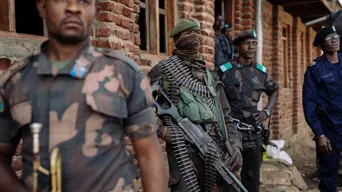Uneasy calm in east DRC after regional ceasefire appeal
Pupils in the regional capital Bukavu were returning to school, an AFP journalist saw, after schools shuttered in the city Friday as residents began to flee and shops closed over fears of an imminent attack by M23 fighters.

Soldiers of the Armed Forces of the DRC (FARDC) observe integration examinations for military specialities at the ‘general Major Chicko Tshitambwe’ military camp in Mambango on the outskirts of Beni, North Kivu, in the east of the Democratic Republic of Congo, on December 14, 2024. Picture: PHILÉMON BARBIER / AFP
BUKAVU - Eastern DR Congo appeared calm for a second day Monday, after regional powers appealed for a ceasefire amid fears the fighting could spark a wider conflict.
Pupils in the regional capital Bukavu were returning to school, an AFP journalist saw, after schools shuttered in the city Friday as residents began to flee and shops closed over fears of an imminent attack by M23 fighters.
The Rwanda-backed M23 has in recent months swiftly seized tracts of territory in mineral-rich eastern Democratic Republic of Congo.
Fighting has killed thousands and driven vast numbers from their homes.
The front line was calm at midday Monday after intense fighting Saturday about 60 kilometres from Bukavu, the capital of South Kivu province, according to local and security sources.
The M23, which claims to protect ethnic Tutsis, began advancing in South Kivu after late last month taking control of Goma, the capital of neighbouring North Kivu province that borders Rwanda.
East and southern African leaders at a summit on Saturday called for an "immediate and unconditional" ceasefire within five days, fearing the conflict would spill over into neighbouring countries.
Rwandan President Paul Kagame and his Congolese counterpart Felix Tshisekedi took part in the talks, the latter via video link.
The European Union welcomed the announcement by the regional leaders, whose final summit statement made no explicit reference to Rwanda or its part in the conflict.
Germany remains "deeply concerned about a possible advance of the M23 militia and Rwandan troops" towards Bukavu, a foreign ministry spokesman said.
"This threatens further heavy fighting and indescribable suffering for the people in the region," Sebastian Fischer told reporters, adding Germany was "currently not seeing any signs that the ceasefire is being observed".
'DESPICABLE ACTS'
Around 80 Congolese army soldiers went on trial Monday at a military court in Bukavu, accused of "murder, rape, squandering of war munition, fleeing before the enemy, pillaging, revolt and loss of weapons".
"They committed despicable acts against the population, which is contrary to the mission and the trust placed in them, which is the safeguarding of sovereignty and the protection of the population," said Major Colonel Jerome Bayawa, a representative of the public prosecutor at the military court.
Several civilians were killed over the weekend in circumstances that are still unclear in the town of Kavumu and its surroundings.
Kavumu is the last barrier before Bukavu and some 30 kilometres from the city.
The M23 has begun setting up its own administration in Goma, a city of one million people, launching recruitment campaigns, including to create a police force.
Thousands of people displaced by the fighting in North Kivu had found refuge in Goma until the city was captured.
But Monday, the armed group issued a 72-hour warning for any remaining displaced people to leave, several camp officials told AFP.
The UN Human Rights Council Friday launched an investigation into alleged violations and abuses committed in the deadly clashes.
Rwanda denies supporting the M23 militarily and accuses the DRC of sheltering the FDLR, an armed group created by ethnic Hutus who massacred Tutsis during the 1994 Rwandan genocide.